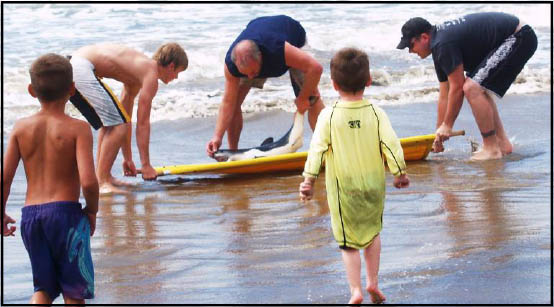|
Aquarium News
Summer is a busy time for the aquarium. Between
hosting visitors, supporting the Discovery Program, and
volunteering for the Marine Mammal Stranding
Network, there is not much time for additional
outreach. Now that autumn is here, staff are again
gearing up for a variety of outreach projects. Here are
some recent highlights:
- The Discovery Program ran its fourteenth year on
the beach and at the estuary with support from the
Aquarium. Staff shared information with 300 visitors
per day during its 23 program days.
- Aquarium staff, as Marine Mammal Stranding
Network volunteers, responded to more than 34
strandings between June and September. Most of
the animals washed ashore dead and were
necropsied to determine cause of death. Many of
the rest were baby seals. Staff posted signs
encouraging the public to leave the seals alone so
their mothers would return to them.
- Aquarium staff picked up a variety of sharks on the
beach. Most were dead on arrival and will be used
for dissections by local students.
- On October 22 General Manager Keith Chandler
and staff member Tiffany Boothe showed a Power-
Point presentation on the Aquarium to the local
Kiwanis. They discussed the aquarium’s 70 year
history, and its current projects and partnerships.
The presentation included historic photos of the
aquarium building as a natatorium (salt water
swimming pool), photos of outreach, and Marine
Mammal Stranding Network activities.

A regular summer day for Aquarium Staff Keith Chandler
works with volunteers to take a live salmon shark that
washed ashore to a tank where it could rest and recuperate.
|
|
Important Beach Safety
1. Never turn your back on the ocean.
Sneaker waves are very powerful, sometimes strong
enough to knock over an adult.
2. Avoid logs in the surf.
They may look stable, but the ocean can roll logs large
enough to crush you.
3. This is not a safe area for swimming
in the ocean.
Be aware there is a strong undercurrent. Children should
be kept within arm’s reach and should go no deeper than
their knees.
4. Completely extinguish your campfires.
Embers can burn for days if left or covered.
5. Leave marine mammals alone.
Marine mammals can carry diseases transmittable to humans.
|
|
"The World of Haystack Rock"
Lecture Series
|
|
The Friends of Haystack Rock have organized a lecture
series for the first Thursday of each month, November
to April, from 7pm to 8:30pm at the Cannon Beach
Public Library.
Thursday, Nov.5 - Nathan Sandel, Maritime Museum
"Pinnipeds and Cetaceans of the Pacific Northwest"
Thursday, Dec. 3 - Doug Deur, PSU and U. of Washington
"Speaking of Haystack: Native Ways of Knowing the
Coastal Landscape"
Thursday, Jan. 7 - Lauren Reinalda, Intern with NOAA
"As the World Terns-Life as a Biologist on East Sand
Island"
Thursday Feb. 4 - Roy Lowe, U.S. Fish and Wildlife
"The Haystack Rock-An Isle in a Sea of Refuges"
Thursday March 4 - Bob Bailey, OR Department of Land
Conservation and Development
"Living with Climate Change on the Oregon Coast"
Thursday April 1 - Shelley Parker, Oregon Parks Interpreter
"Maritime Mystery"
|
|


